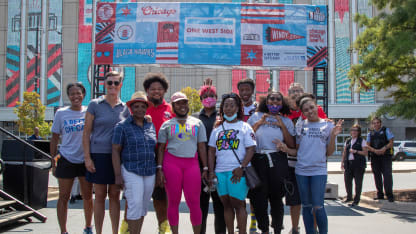West Side leaders have come forward in a major way to encourage participation and offer genuine emotional investment, as touted during the event by Blackhawks President of Business Operations Jaime Faulkner. Their cooperation with the financial support groups is gradually paying dividends.
"It is great to see the community partners that we have who have stepped up, to be in one place with them," said Jamyle Cannon, who owns and operates The Bloc, a nonprofit boxing program on the West Side and one of the five first-year grantees. "The Chicago Blackhawks, A Better Chicago, United... they have been instrumental to our growth and success over this past year."
"To not only be with them but the other partners that they support... in my view there is a palpable energy which that creates. It gives us a sense of optimism for where we are all headed as individuals and also where the West Side is headed in general," Cannon added.
Cannon and the other local leaders of One West Side have long been stewards of hope and optimism in their West Side neighborhoods. With the resources provided through the partnership, they can continue to grow their hyperlocal impacts in the areas that need it most.
"There are so many kids on the West Side who don't have a place to call their own. So many kids on the West Side who have been told that they are not good enough, that they don't have what it takes. And they come to the Bloc to prove those people wrong," he said.
"They come to the Bloc to become their absolute best self. Getting support for them is an incredibly fulfilling feeling. Because when we support young people, when we give them the tools and resources to succeed, they pay us back with their success. We are seeing that with our kids with the increase in support from the Blackhawks, United and Better Chicago."



















